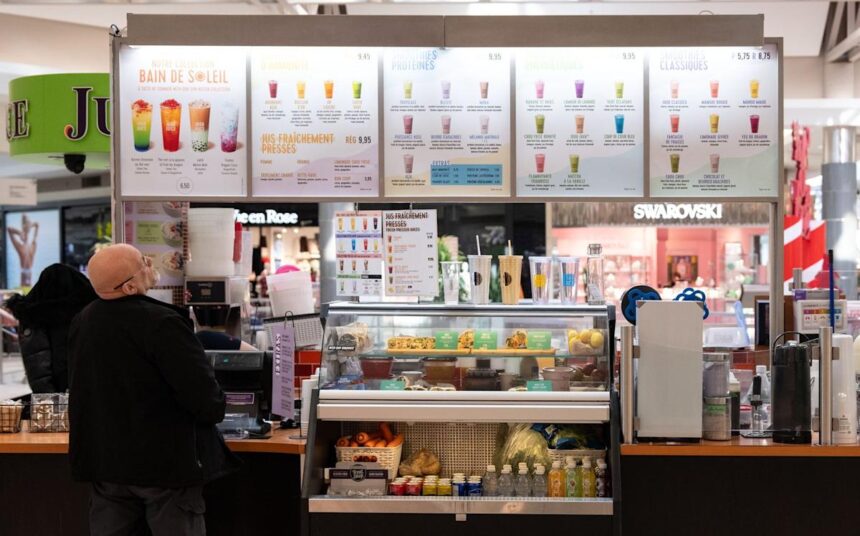The restaurant franchisor behind some of Canada’s most recognizable food court staples just served up a mixed platter of financial results. MTY Food Group Inc., the company operating brands like Thai Express, Manchu Wok, and Cold Stone Creamery, posted a 13% profit increase in their second quarter despite struggling with sagging sales in their U.S. operations.
MTY’s net income reached $30.3 million for the quarter ending May 31, up from $26.8 million in the same period last year. That translates to $1.24 per diluted share compared to $1.10 in 2023—a respectable improvement that defied some market expectations given the challenging restaurant environment.
The Montreal-based franchise operator’s total revenue slipped slightly to $278.6 million, down 2% from $285.2 million last year. This modest revenue decline masks some deeper geographical divides in the company’s performance.
“Consumers continue to be very selective with their discretionary spending, which impacts traffic in our network,” explained Eric Lefebvre, MTY’s Chief Executive Officer, in the earnings release. This spending hesitation appears particularly pronounced in American markets, where same-store sales decreased by 3.8%.
Canadian operations showed more resilience with system sales growing 2% to $1.1 billion. The contrast highlights how regional economic conditions and consumer sentiment are creating uneven performance across MTY’s sprawling network of nearly 7,100 locations.
Behind these numbers lies a story about the changing dynamics of the quick-service and casual dining segments. Restaurant brands are navigating a post-pandemic reality where inflation has eroded purchasing power and consumers have become increasingly selective about where they spend.
According to Statistics Canada data, food prices have increased approximately 21% since 2019, forcing many Canadians to reconsider their dining habits. Restaurant Economics, an industry consulting firm, estimates that the average household has reduced restaurant visits by 1.2 times per month compared to pre-pandemic levels.
MTY’s portfolio diversity has provided some buffer against these headwinds. The company operates in various segments from mall food courts to casual dining establishments and dessert shops, allowing them to capture different parts of the consumer spending spectrum.
“Our diversification strategy has proven valuable during this period of cautious consumer spending,” Lefebvre noted during the analyst call. “Brands focused on value propositions have generally performed better than our premium offerings.”
The company’s digital initiatives appear to be paying dividends as well. Digital orders now account for approximately 22% of total sales across applicable brands, up from 18% a year ago. This shift toward digital ordering has helped MTY reduce labor costs in some locations while improving order accuracy.
Interestingly, MTY’s adjusted EBITDA increased by 1% to $67.8 million despite the revenue decline, suggesting improvements in operational efficiency. The company has been implementing cost-control measures across its network, including optimizing supply chains and renegotiating leases where possible.
These efficiency gains have become increasingly important as food and labor costs remain elevated. According to Restaurant Canada’s industry data, food costs for commercial establishments have increased approximately 6% year-over-year, while labor expenses have grown nearly 5%.
From a balance sheet perspective, MTY continues to maintain a solid financial position. The company reported free cash flows of $39 million for the quarter, allowing them to reduce net debt by $22.5 million. This debt reduction strategy appears to be resonating with investors who have been increasingly focused on financial stability in an uncertain economic environment.
MTY’s recent performance also reflects broader trends affecting the franchise restaurant sector. Shopping mall traffic—where many MTY brands operate—has not fully recovered to pre-pandemic levels in certain markets. According to retail analytics firm Placer.ai, mall foot traffic in the U.S. remained approximately 8% below 2019 levels during the first half of 2024.
The company’s growth strategy has shifted somewhat in response to these challenges. After several years of aggressive acquisitions, MTY has become more selective in its expansion approach. The company opened 103 new locations during the quarter while closing 123 underperforming stores, resulting in a net reduction of 20 locations.
“We’re focused on quality over quantity at this stage,” Lefebvre explained. “Opening locations in the right areas with the right operators is more important than simply growing our store count.”
Looking ahead, MTY faces both challenges and opportunities. On one hand, persistent inflation and economic uncertainty continue to pressure consumer spending. The Conference Board of Canada projects that household consumption will grow by just 1.8% in 2024, below historical averages.
On the other hand, the company’s broad brand portfolio and operational improvements position it to potentially outperform competitors as the market stabilizes. MTY’s focus on digital ordering and delivery services also aligns with lasting consumer preference shifts that emerged during the pandemic.
For investors, MTY’s latest results offer a cautious but hopeful outlook. The company maintained its quarterly dividend at 28.5 cents per share, signaling confidence in its cash generation capabilities despite market headwinds.
As consumers continue navigating a high-cost environment, MTY’s ability to adapt menu offerings, pricing strategies, and operational models across its diverse brand portfolio will likely determine whether they can continue to grow profits even if top-line growth remains challenged.






